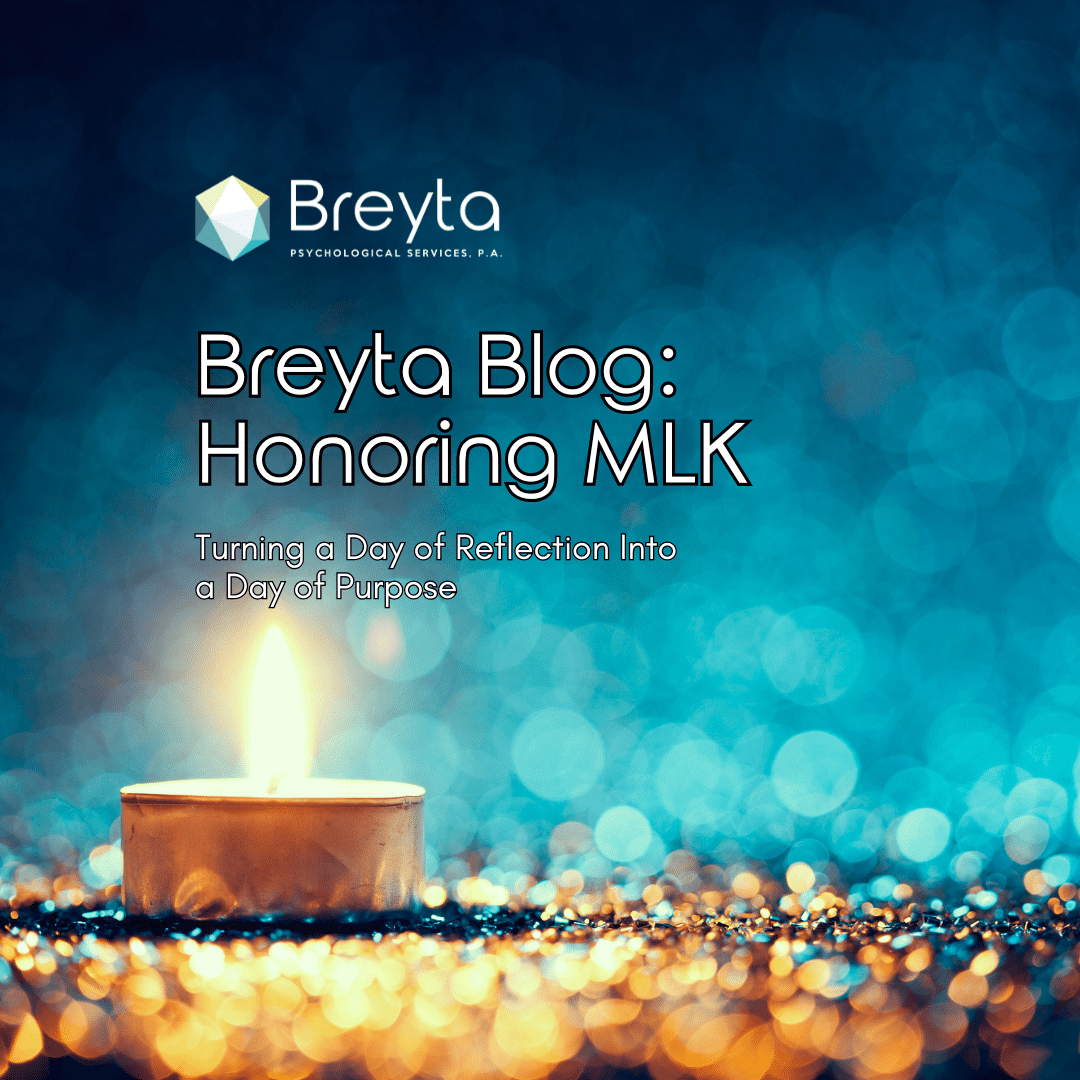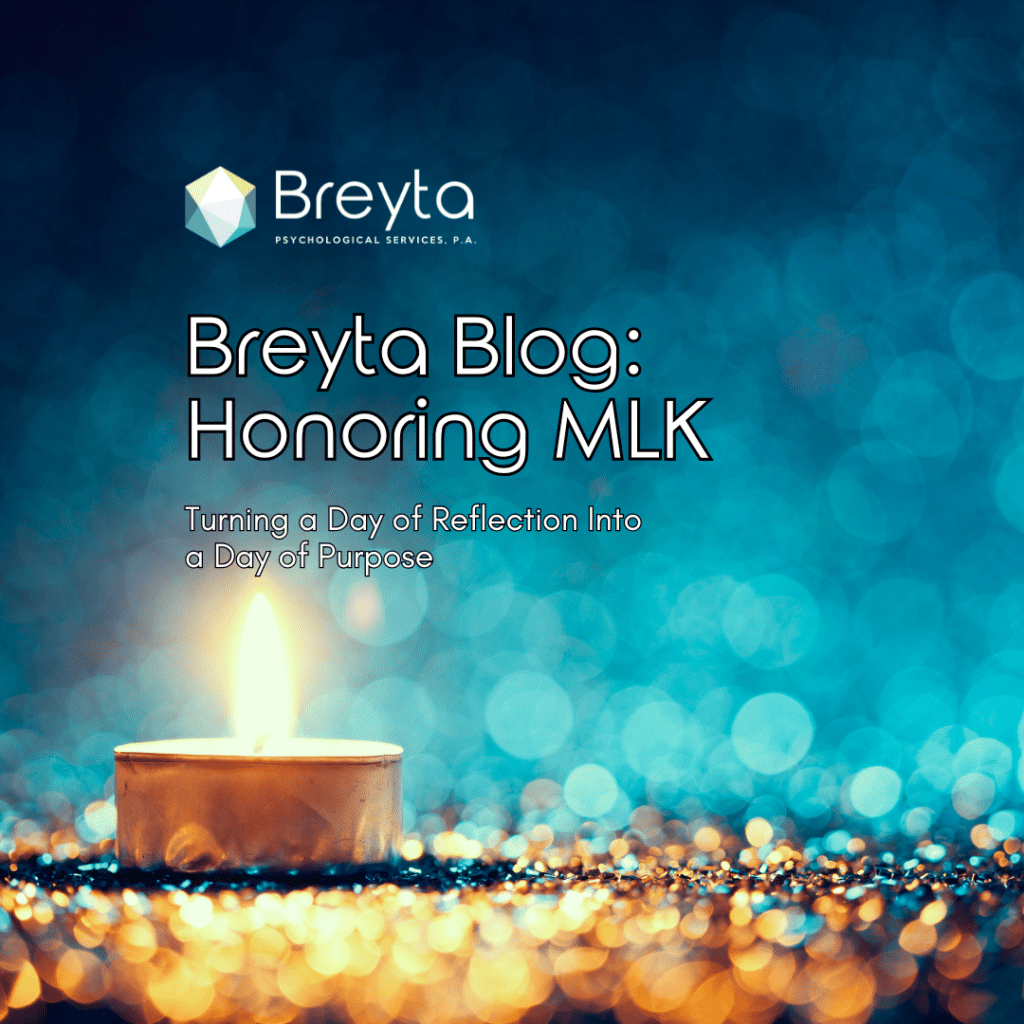by Ameenah Ikram, Psy.D., HSP-P
January is truly a dynamic month. It marks the beginning of a new year, which for many, is associated with brand new goals, hopes, and dreams. Individuals may present as more motivated as they navigate “fresh-starts” associated with new jobs, growing families, clean slate school semesters, and novel fun experiences ahead. This month often elicits an internal “reset” button, inspiring many of us to set resolutions for the things we’ve yet to accomplish. It can also serve as a reminder of the goals and priorities we may have overlooked in the past year. . All in all, for most, early January is “both/ and.” It is a time filled with new beginnings, and may also be a time of continuing the same journey of becoming the best version of oneself.
As the middle of January approaches, oftentimes reality sets in. As life gets busy, our lofty resolutions may start to feel a little too overwhelming, and many of the same habits of the previous year trickle back in as well. As the high from the holidays falls further into the background, we’re often looking for the next time we will “catch a break.” It’s not uncommon to start searching for the next holiday on our calendars, which at this juncture is a special day in January.
Martin Luther King Jr. Day (MLK Day) is the next federal holiday after the New Years holiday that many Americans use as a time to take off and relax. In reality, there is rich history to this day that often gets overlooked. MLK Day is a day that celebrates Dr. Martin Luther King Jr., who was a prominent civil rights leader and activist during the American civil rights movement. Dr. King spent his life peacefully advocating for equality and human rights for African Americans and other marginalized groups facing injustice. The purpose of Dr. King’s monumental work was to bring about peace, love, equality and justice for all, and his messages are ones that continue to deeply touch and impact many across the world.
Dr. King’s hard work is reflective of how many “days on” he spent advocating for social justice. Therefore, although this day is a time where many have the “day off,” a more mindful and growth- oriented way of honoring this day is to tune into our internal biases, assumptions, stuckpoints, and judgements. It is important to reframe this day as one that can actually bolster the momentum that was felt at the beginning of the month with reflection and committed action.
As mentioned earlier, most individuals strive to be better than they were the year prior, and this involves being better to ourselves, others in our lives, and to the world around us. This also entails tapping into values related to becoming more self-aware, increasing compassion, challenging unhelpful biases or negative ways of thinking, and implementing a new way of living that is more mindful and culturally humble. MLK Day is a day where we can strive to do exactly that.
The New Year and MLK Day seamlessly tie into the idea of cultural humility. Cultural humility tells us that we as humans are always learning, growing, and changing. It reminds us that the concept of “New Year New Me” is something that is ongoing and can happen any day, and not just at the start of a new year. It also reminds us that self-improvement is a marathon and not a sprint. Moreover, cultural humility reminds us that there is no stopping point to positive change. It takes away the pressure that we have to follow large and often unsustainable resolutions which ultimately fail and cause our efforts to fatigue.
Cultural humility also challenges us to remain open and curious about the experiences and perspectives of others. Unlike cultural competence —which is often misunderstood as a fixed goal of “mastering” diversity—cultural humility acknowledges that positive change is a lifelong journey. It removes the pressure of striving for perfection and instead focuses on the process of continuous reflection, learning, and unlearning. It reminds us that the goal of life is not to become an expert, but to remain an active learner. Cultural humility tells us that we should always be curious, and continue to seek sustainable growth throughout the course of our months, years, and entire lives.
Below you will find 6 components of cultural humility which relate to much of what Dr. King practiced as an activist.
- Become other- focused instead of self focused. New year’s goals are often become much about ourselves, but what we don’t realize is that remembering those around us can help us enhance our own internal sense of sensitivity, approachability, and connectedness. Being other- focused inevitably helps us navigate our interpersonal relationships better and understand others and their needs more deeply.
- Respect for other cultures. Respect is easy to promise other people, but it is hard to actually practice and give to others. Respect involves listening and learning about another’s culture without putting your own cultural narrative first. Oftentimes individuals give superficial impressions of respect without actually working to understand how to give respect to another person or culture on a meaningful level.
- Believe in the lack of superiority of your own culture. Humans tend to think their own culture is the best. This is true for skin color, habits, religion, holidays, customs, values, beliefs, etc. Humans tend to be most comfortable with what is most familiar, which causes problems with accepting cultures that are different from one’s own. Cultural humility means actively working to change this view, by suspending belief in the superiority of your own culture.
- Have an accurate view of yourself and your limitations. Cultural humility tells us that we must strive to understand our weaknesses, reminding us that growth is a continuous process. Unlike cultural competence which reinforces the false narrative that we “made it” and have learned everything we need to know, the truth is, we are always on a diversity journey. No one is ever “there yet.” In fact, it is actually dangerous to think that you are at an end stage.
- Seek new experiences and others. Cultural humility reminds us that in order to grow, we have to go beyond our comfort zone. We have to go to the places which challenge us. This may involve entering spaces where we are not the status quo, and places where we are not easily assimilated, so that we can better understand the ways in which marginalized individuals constantly have to accommodate.
- Lifelong commitment to redress power imbalances. As Dr. King said, “Injustice anywhere is a threat to justice everywhere.” This means that we must always act on our developing realizations about power imbalances, and actively work to change society through what we do and say.
While understanding cultural humility is the first step, making an effort to implement it in daily practice is what promotes positive change! Below are ten tangible ways to practice cultural humility on your “day on.” Using MLK Day as a primary touch stone for trying new ways of engaging and behaving can truly help re-motivate yourself towards becoming a better you! Making small changes internally at a sustainable momentum is what prevents us from remaining stagnant, and helps to create a world of positive change. Additionally, these steps can be used as behavioral activation tools to help boost mood, increase self-esteem, and instill a newfound sense of hope.
- Before marching for justice, do your own personal work. This can be done via thinking, journaling, and being curious about your own cultural reflections regarding race, gender, sexual orientation, citizenship status, socio economic bracket, etc. It is important to recognize and understand how you are deemed as privileged before identifying the ways in which you are oppressed.
- Accept and understand where you are on your diversity journey. It is important to admit biases, privileges, and stereotypes. We often assume we are further along these journeys than we are in actuality. It can be dismissive and annoying to others to claim to be ahead of where we are, because it reflects the opposite of being humble. While doing this reflection, it is important to practice self-compassion and not judge yourself! It is still okay to be where you are even if it is not okay to stay there long-term.
- Question how you learned history. More often than not, we are often taught history in one way. It is important to take a step back and question what you have been taught. For example, make an effort to re-examine your understanding of the founding of the US, the treatment of native people, slavery, the civil war, etc. Try to read books that challenge history the way you learned it. Try to seek out resources from voices that often go unheard. You will be able to connect with a subject in a deeper way by hearing a narrative that may be different from the mainstream one you have been taught.!
- Change your spaces. Make your home, car, or office space be one that welcomes everyone.! Make it a priority to welcome those of diverse groups, even if you don’t belong to them. This helps create greater safety and allyship with others around you.!
- Work towards crushing imposter syndrome. When certain parts of our identities are treated as lesser than by society, oftentimes we begin to believe that we are in fact lesser than. In reality, this is not true! Crushing imposter syndrome involves quieting the voices in our head that fill us with doubt.
- Talk about diversity with everyone, not just people you assume are diverse. We often believe that we only need to talk about diversity if someone “seems” different from us, but in reality, we need to bring up diversity even with people who “seem” like us. This helps create space to correct our assumptions (e.g. heteronormativity: we assume someone is straight and they are bi or gay; assuming whiteness of someone light skinned although they may be biracial, Native American, or Latinx). If we take the initiative to open the dialogue, it shows openness to learning and that we are humble. It is unhelpful to wait for others to correct our assumptions. People from minoritized backgrounds often get exhausted by talking about race/gender/sexual orientation/religion all of the time. People privileged by our society have also historically held the privilege of never having to talk about it. We change this structure by bringing up diversity more often, and with all people.
- Bring up conversations about microaggressions. Microaggressions involve making a statement or engaging in an action that is unintentionally harmful or discriminatory against members of a marginalized group. Microaggressions are sadly very common and the likelihood of committing some in our lifetime is high. That being said, it is essential to acknowledge them when they happen. It is important to ask others to point them out when they are committed by you, and it is also important to point them out when you see them committed by others. Although this may feel uncomfortable, avoiding it is part of the problem and only maintains harmful power differentials.
- Reframe how you apologize. Apologizing is something we all can struggle with at times. It can be difficult to admit when we’re wrong and sit with the emotions that come with that awareness. When apologizing, it is important to remember that good intentions do not negate a bad impact. A sincere apology has 3 parts: “I am sorry,” “It is my fault,” and “What can I do to make it right?.” It is important to thank the harmed person for bringing up the pain you caused them and really take ownership of what was done to them. While apologizing may not be easy, it can help you grow.
- Recognize power differentials and be committed to changing them. Talking about diversity also helps people who are in power recognize their power. It helps people who are privileged begin to recognize some of their privileges. It also helps people see how we have societal and institutional ways of privileging some and marginalizing others. If we are really going to change and transform society, we have to talk to the people who represent the status quo–those who are benefitting from all of the power and privileges. It is impossible to change the deep structural inequalities in our society by expecting people without historical or current power to do all of the heavy lifting. However, when we acknowledge these dynamics, we create opportunities for everyone to grow, share the responsibility for change, and contribute to building a more inclusive society.
- Get involved. Do what you can to put yourself out there. This can look like participating in discussions, volunteering, peacefully protesting and advocating, and voting!
Dr. Ameenah Ikram is a compassionate and skilled licensed psychologist specializing in trauma, women’s health, and multicultural issues. With a collaborative and evidence-based approach, she empowers clients to heal, grow, and live in alignment with their values. Dr. Ikram is passionate about fostering resilience and helping individuals navigate life’s challenges with authenticity and courage.
If you’re ready to begin your journey toward healing and self-discovery, reach out to us today to explore how Dr. Ikram can support you in achieving your goals.





